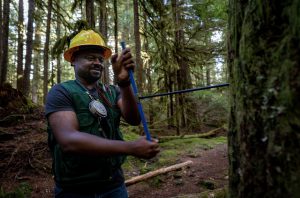 University of Florida College of Agricultural and Life Sciences alumnus Terry Baker graduated in 2004 with his degree from the School of Forest Resources and Conservation (SFRC), now known as the School of Forest, Fisheries, and Geomatics Sciences (FFGS). He is currently the CEO of the National Society of American Foresters.
University of Florida College of Agricultural and Life Sciences alumnus Terry Baker graduated in 2004 with his degree from the School of Forest Resources and Conservation (SFRC), now known as the School of Forest, Fisheries, and Geomatics Sciences (FFGS). He is currently the CEO of the National Society of American Foresters.
What first sparked your interest in your major?
I came to the School of Forest Resources and Conservation through a cooperative agreement between the USDA Forest Service, University of Florida, and Florida A&M University. This agreement was under the umbrella of the USDA Forest Service’s Multicultural Workforce Strategic Initiative. This initiative was constructed to bring more diverse professionals into forestry and natural resources through land grant institutions. In a sense, part of what brought me to CALS was the fact that the forestry program was the only 4-year accredited program in the state. Growing up in the Florida panhandle, I had no idea that there was a possibility of a career in forestry. The more I learned through internships and my studies, the more I knew I had found the right profession.
Was there a particular CALS faculty member or staff that was influential in your career path?
There may be too many to name. The faculty and staff in SFRC were and are very supportive and involved with their students. It creates such a great community throughout your time in the program and after graduation. Dr. Don Rockwood was the program contact for my cooperative program. He kept me connected with the requirements of the program. Dr. Taylor Stein was the faculty advisor of the Society of American Foresters student chapter. He encouraged me to be engaged and run for chair of the chapter. Little did either of us know that I would one day be the CEO of that association. At the time Scott Sager was the student services coordinator, he is now the school forest manager. In addition to making sure I graduated on time, Scott was and is a trusted friend and peer. I often seek his insights as I work through challenging decisions.
What do you find to be the best part of your job?
Working in forests to manage various natural resources is one of the most fulfilling careers anyone can have. Management of forests gives you the opportunity to have local, regional, national, and international impacts. It is a calling to make things better for yourself and others. One of the best perks can be finding the best hunting, fishing, birding, hiking and camping spots. In short, we get paid to go places people pay to go.
What are some exciting projects you have worked on in the course of your career?
I have fought wildfires in Florida, South Carolina, Virginia, Arizona, Oregon, Washington and Colorado. That is some of the most dangerous, thoughtful and fulfilling work that I have had the opportunity to participate in. I have managed forests for multiple uses with the USDA Forest Service. Through that work, I have helped restore habitats for endangered fish, trans-located endangered birds, supplied local communities with wood products, cooperated in the management of hydroelectric and flood control dams, and engaged countless students about the benefits of being outdoors.

What advice would you give to students who are interested in forest resources and conservation?
Jump in with both feet. There is so much variety to what can be done in forestry and natural resource management that it can feel overwhelming. Find a place to start, learn and grow (pun fully intended). As a student and professional, I was very involved in my professional association. That engagement created a lot of opportunities for me personally and professionally.
“If you care about the environment and enjoy the outdoors, consider the tangible skills learned in forestry and natural resources as a means of finding practical and thoughtful solutions to some of the most pressing questions facing our country and the world.” – Terry Baker
The forest resources and conservation major introduces students to a wide range of natural resource fields, including forest ecology, ecosystem management, economics, environmental policy, modern technology applications for natural resource managers, wildlife management, and forest health. Students spend significant time in the field gaining hands-on experience with ecological and management principles. Find a CALS major that suits your interests by taking our majors quiz. You can also find information regarding our undergraduate and graduate programs on our website. Questions for Terry Baker regarding his experiences in forest resources and conservation should be directed to terryb@safnet.org.
 0
0
